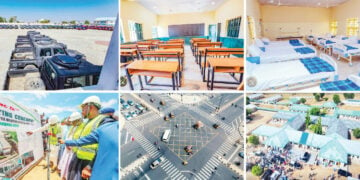The Aircraft Owners and Pilots Association of Nigeria (AOPAN) has called on state governments across the country to introduce targeted incentives such as landing fee waivers and operational discounts to attract airlines and boost traffic into state-owned airports.
AOPAN president, Dr Alex Nwuba, made the call in an interview with LEADERSHIP, stressing that such measures would serve as a short-term financial bridge to generate the critical mass of traffic needed for the long-term viability of state-owned aerodromes.
He said many state-built airports remain underutilised, not because they are inherently unviable but because of poor optimisation and weak commercial strategies.
“The premise is that no existing airport is inherently unviable; it is simply being improperly managed and optimised. The infrastructure is a valuable, sunk-cost asset—the challenge is leveraging it correctly to generate a return,” Nwuba stated.
He explained that the focus should immediately shift toward commercialisation and operational efficiency, leveraging existing infrastructure to turn dormant facilities into regional economic hubs.
“Since passenger traffic is currently low, the quickest path to viability is activating the asset for high-value cargo and supply chain integration,” he said.
Dr Nwuba advised that immediate, minimal investment should target only the most critical missing links, such as cold storage facilities, modern security scanning systems, and efficient freight handling equipment, enabling airports to handle exports of high-value perishables like agricultural produce and flowers.
Beyond aviation operations, he urged state governments to lease available land and unused terminal space for high-revenue-generating ventures, including business parks, logistics hubs, renewable energy projects, and trucking depots.
“Use a portion of the state’s potential savings to fund highly attractive, temporary landing fee waivers and discounts for new airlines, cargo operators, and charter services,” he said. “This acts as a short-term financial bridge to lure the critical mass of traffic needed for long-term route viability.”
Dr Nwuba further encouraged states to market their airports’ runway capacity and strategic locations to regional courier and e-commerce companies, positioning them as fulfilment and distribution hubs that guarantee steady parcel traffic and logistics activity.
He also highlighted the need to improve road connectivity between airport facilities and industrial or agricultural clusters, enhancing last-mile efficiency for commerce and supply chains.
“The extensive land holdings are often the airport’s greatest untapped financial asset, requiring commercial expertise to unlock. Attract private investors to establish Maintenance, Repair, and Overhaul (MRO) facilities or flight training academies. These create specialised, high-wage jobs and a self-sustaining aviation ecosystem,” he added.
Finally, he noted that the underutilised terminal buildings of many state-owned airports should be transformed into welcoming gateways, suggesting partnerships with hotels and tourism operators to promote travel and leisure.
“The underutilised terminal must be a welcoming, efficient gateway to the state. Partner with local hotels and tourism operators to offer dedicated shuttle services and packaged deals to draw leisure travellers immediately,” he said.





